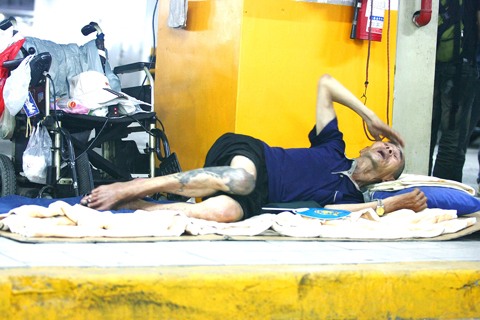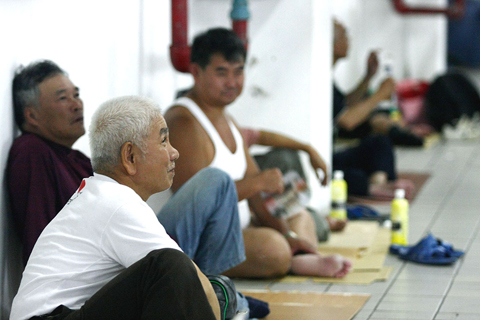Fifty-year-old Kao (高) moved to Taipei five years ago to work in a bakery, but because of the economic crisis, the bakery where the native of Pingtung worked closed and he ended up living in an underground car park at Taipei Railway Station.
“I do not have any family except my mother. I am still working part-time here and there while looking for a full-time job. I must survive because my mother is still counting on me. I can’t give up,” he said.
Kao is just one of dozens of residents of the east car park who are a constant source of concern for railway police and social workers.

PHOTO JIMMY CHUANG, TAIPEI TIMES
“We cannot drive them out because they are not breaking any laws,” said Jhang Tian-cih (張天賜), deputy chief of the Railway Police Bureau’s First Police Section.
Jhang visits the residents at the east car park every couple of days to make sure everything is under control. He said that about 300 people sleep at the station on a regular basis.
“The total has increased recently, probably because of the sluggish economy,” he said.

PHOTO: JIMMY CHUANG, TAIPEI TIMES
Their presence has caused problems for police because women are afraid to go there after dark. The absence of toilets and lavatories is also a problem.
Every now and then, quarrels break out between the residents, in which police have to intervene to maintain order.
“We are grateful that nothing serious has happened,” Jhang said.
The Railway Police Bureau’s records between October and March show that 236 “residents” live in the car park. Jhang said a “resident” is a person who returns to the station every night and regards the car park as his home. Among them, police have arrested 10 wanted fugitives while three have been detained for theft and another one for raping a woman who lived in the car park.
“We conduct checks — individual by individual — every now and then,” Jhang said.
The officer said he would not call these people homeless because many are not really homeless. Some have daytime jobs and families, but return to the garage at night because they want to avoid paying rent or want to get away from their family.
“These people stay here for various reasons. Very few, however, qualify as legally homeless,” Jhang said. “I dealt with one guy who refused to go with his wife when she came to the garage to take him to live in the US. We all make our own choices. What can you do?”
Many of the car park’s residents are happy there, as Department of Social Welfare Division Chief Troung Fun-chyuan (童富泉) discovered during an operation on May 15 during which they were asked whether they wanted to swap the car park for city government-sponsored sheltered housing.
Their offer was not as popular as expected.
“Every time I visit, I offer them help and ask if they want to go to one of our shelters. Most of them refuse,” Troung said.
Troung said one 70-year-old regular surnamed Chang (張) once said he was very sick and had a family that wanted him back.
“He decided to stay here because all his friends are here. Outside this place he is nothing and lonely,” Troung said.
Chang is known by everybody in the car park, Jhang told the Taipei Times. As he is sick, police check on him every day to make sure he is feeling well.
“We don’t want any incidents in the car park as we are responsible for it,” Jhang said.
While taking care of its residents, the department also helps them to find jobs and organizes regular games.
“We are planning to organize a karaoke contest for the residents of our sheltered homes sometime in July. Some are actually really good singers,” said Chang Hsien-chung (張獻忠), a social worker at the department.
Troung said he and his colleagues had helped a total of 115 people find jobs in the past year. They also helped another 55 rent an apartment or return home. Meanwhile, the department hired 15 elderly who wanted to work, but had difficulty finding a job because of their age.
“We will continue to help them, but we also hope their numbers will decrease,” Troung said.
Two other residents surnamed Wang (王) and Chen (陳) who refused the offer of a shelter home told the Taipei Times they would stay out of trouble, but wanted to stick together.
Wang said he is 42 years old and Chen 38. Both come from Chiayi and have been in Taipei for almost 10 years. They started life in Taipei by taking short-term jobs at construction sites.
But when the economic crisis hit, job opportunities vanished and they could no longer afford to pay rent.
“We haven’t given up. We just don’t know where to go,” Wang said. “I feel so sorry for my girlfriend because she also has to stay here with me.”

Taiwan would benefit from more integrated military strategies and deployments if the US and its allies treat the East China Sea, the Taiwan Strait and the South China Sea as a “single theater of operations,” a Taiwanese military expert said yesterday. Shen Ming-shih (沈明室), a researcher at the Institute for National Defense and Security Research, said he made the assessment after two Japanese military experts warned of emerging threats from China based on a drill conducted this month by the Chinese People’s Liberation Army’s (PLA) Eastern Theater Command. Japan Institute for National Fundamentals researcher Maki Nakagawa said the drill differed from the

‘WORSE THAN COMMUNISTS’: President William Lai has cracked down on his political enemies and has attempted to exterminate all opposition forces, the chairman said The legislature would motion for a presidential recall after May 20, Chinese Nationalist Party (KMT) Chairman Eric Chu (朱立倫) said yesterday at a protest themed “against green communists and dictatorship” in Taipei. Taiwan is supposed to be a peaceful homeland where people are united, but President William Lai (賴清德) has been polarizing and tearing apart society since his inauguration, Chu said. Lai must show his commitment to his job, otherwise a referendum could be initiated to recall him, he said. Democracy means the rule of the people, not the rule of the Democratic Progressive Party (DPP), but Lai has failed to fulfill his

OFF-TARGET: More than 30,000 participants were expected to take part in the Games next month, but only 6,550 foreign and 19,400 Taiwanese athletes have registered Taipei city councilors yesterday blasted the organizers of next month’s World Masters Games over sudden timetable and venue changes, which they said have caused thousands of participants to back out of the international sporting event, among other organizational issues. They also cited visa delays and political interference by China as reasons many foreign athletes are requesting refunds for the event, to be held from May 17 to 30. Jointly organized by the Taipei and New Taipei City governments, the games have been rocked by numerous controversies since preparations began in 2020. Taipei City Councilor Lin Yen-feng (林延鳳) said yesterday that new measures by

A rally held by opposition parties yesterday demonstrates that Taiwan is a democratic country, President William Lai (賴清德) said yesterday, adding that if opposition parties really want to fight dictatorship, they should fight it on Tiananmen Square in Beijing. The Chinese Nationalist Party (KMT) held a protest with the theme “against green communists and dictatorship,” and was joined by the Taiwan People’s Party. Lai said the opposition parties are against what they called the “green communists,” but do not fight against the “Chinese communists,” adding that if they really want to fight dictatorship, they should go to the right place and face